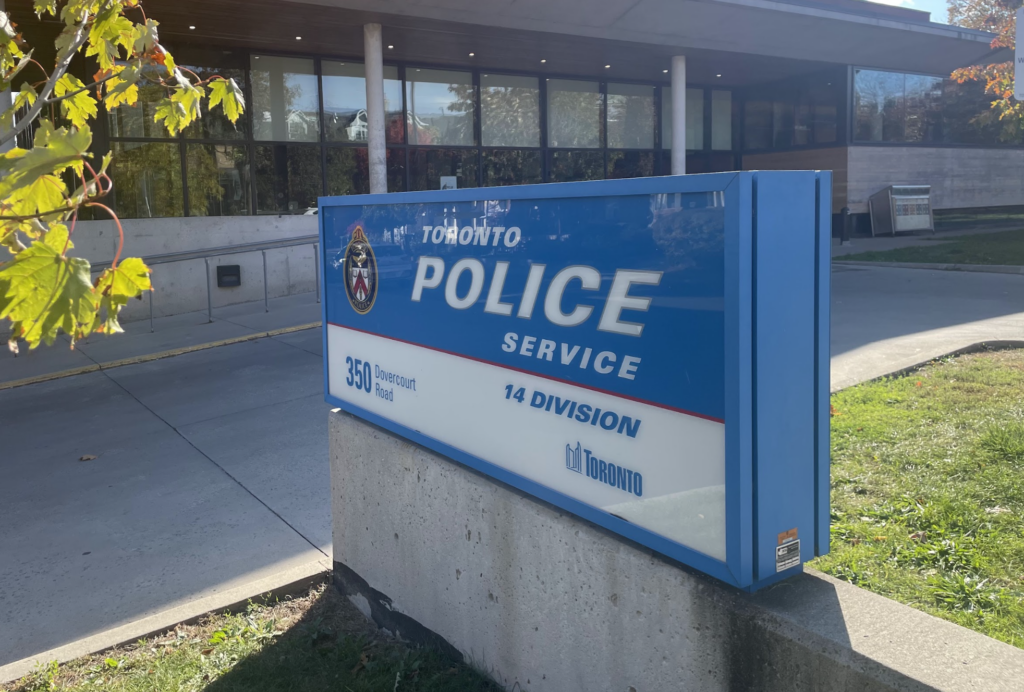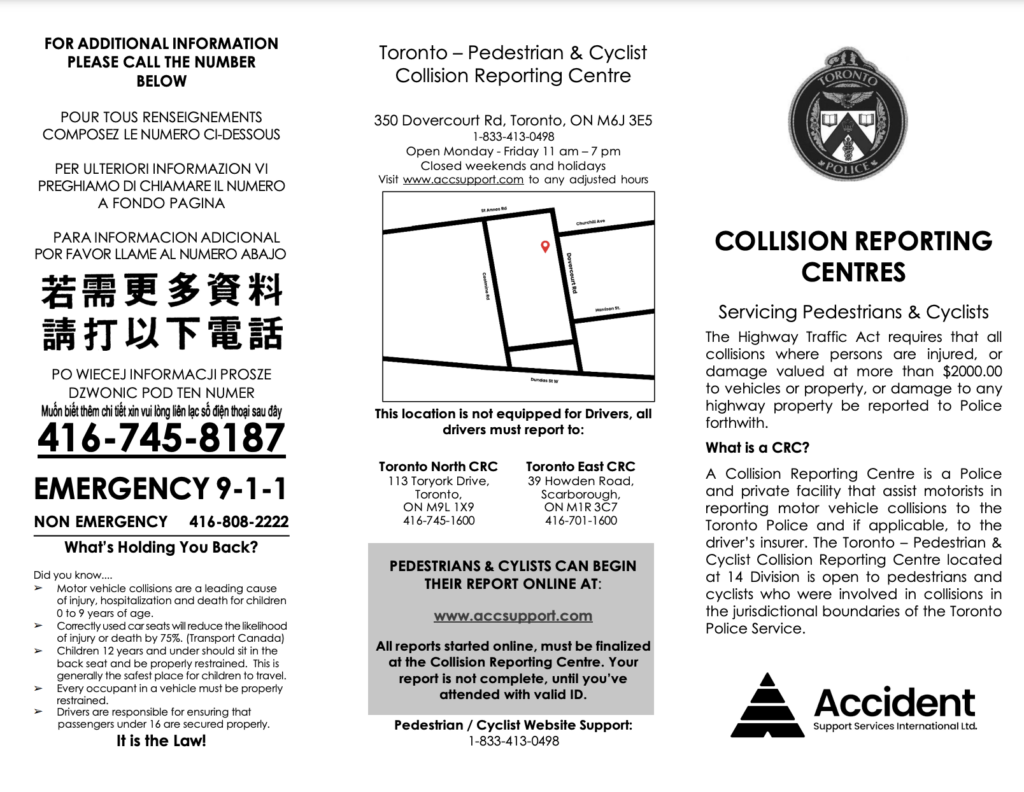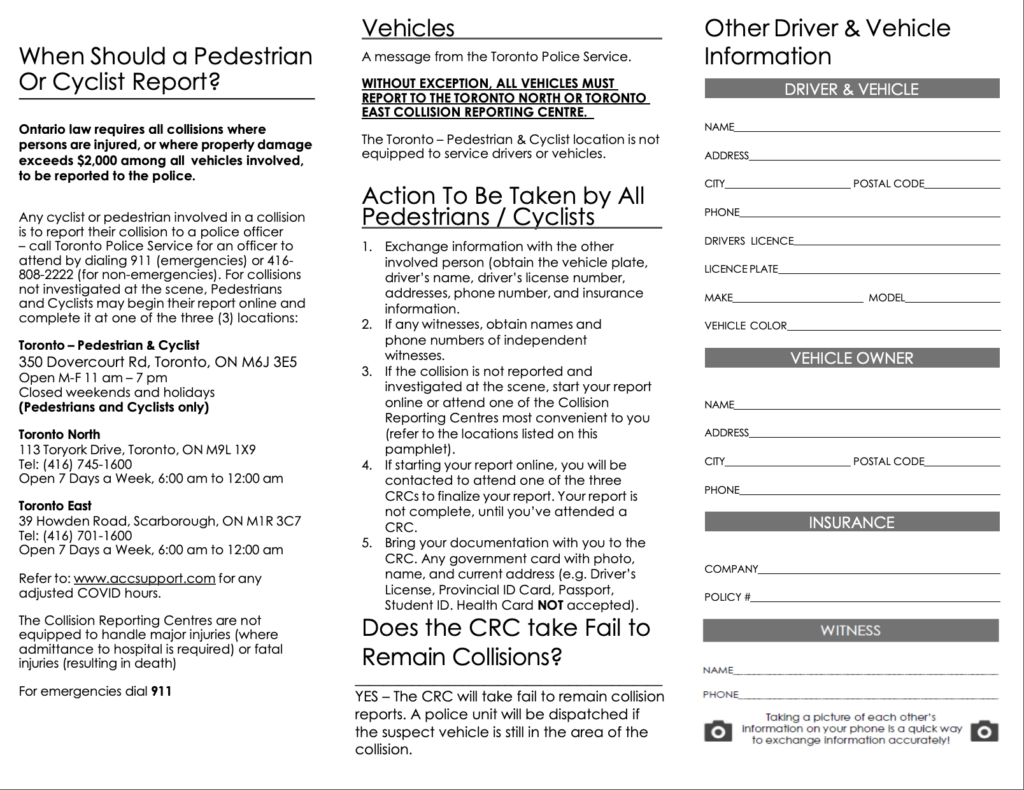
Listen to the full story here:
The Toronto Police Service has opened a dedicated Collision Reporting Centre for cyclists and pedestrians at 350 Dovercourt Rd.
Located in downtown Toronto, the centre offers more accessible reporting for pedestrians and cyclists, as the city’s two other collision centres are located further north in North York and Scarborough.
“This dedicated reporting centre benefits the community by improving safety, as the data collected helps identify high-risk areas and enables targeted safety enhancements, such as better road designs or signage,” reads an emailed statement from Accident Support Services to OTR.
“It also encourages more people to report incidents, building a comprehensive collision database that supports informed policy changes and infrastructure upgrades. The centre aims to create a safer environment for vulnerable road users by offering guidance throughout the reporting process, which may assist with insurance or legal claims.”
“This centre could increase reporting for minor injuries or cases where police aren’t on the scene,” said Anne Harris, a professor at Toronto Metropolitan University (TMU) and epidemiologist specialising in active transportation injuries.
Harris pointed out the underreporting problem that often limits data on cyclist and pedestrian incidents, especially when police are not involved.
While optimistic about the new centre, Harris remains curious about its long-term impact. “I think we would have to wait and see if this reduces barriers to reporting less serious injuries or cases where police aren’t on the scene,” she said.
Toronto Police Service operates two other collision reporting centres for motor vehicle collisions.
350 Dovercourt Rd. mirrors the city’s collision reporting model for the previously established centres, which according to Toronto Police Services “assist motorists, cyclists and pedestrians in reporting motor vehicle collisions that they have been involved in.”
Mia Zurkovic, a fifth-year architecture student at the University of Toronto, relies on her bike as her primary mode of transportation. A few weeks ago, riding home from work, she was passing College Station when a car suddenly turned into her and knocked her off her bike.
“I was very shocked. Getting hit by a moving, metal motorised vehicle. That’s really scary.”
Too shaken at the time to get the driver’s information, Zurkovic said she’d consider using the collision centre if she was ever in the same situation again. “If it would help and actually make a difference, yes.”
“Biking is fun. It’s fast, it’s a good way to get around, it cuts your transit time, and it’s cheap. I never take the TTC because I just like bikes. But it is also incredibly unsafe, especially in Toronto. People are always getting hit,” she said. According to the latest TPS data, 34 bike collisions have been reported this year, with six fatalities.
Roger Morier, a transportation advocate with Toronto Community Bikeways Coalition, sees the centre as a potential contributor to long-term planning, particularly under the city’s TransformTO Net Zero Strategy.
With this strategy, the City of Toronto writes (on it’s website) that it aims to achieve 75 per cent of school and work trips under 5 km by foot, bike, or public transit by 2030.
“We won’t reach those goals unless we install protected bike lanes and make alternatives to cars more attractive,” said Morier, adding that increased reporting could help identify dangerous areas that require improvement.
“More data is better than none,” Morier said. “I don’t think it’ll have any particular bearing on safety of cyclists per se, no direct impact, but perhaps long term in terms of guiding the city towards where to install safe bike lanes that could be really quite useful.”
The Cyclist and Pedestrian Collision Reporting Centre is open from Monday to Friday, 11 a.m to 7 p.m.
This article may have been created with the use of AI tools such as Google Docs, Grammarly, and/or Otter.ai for transcription.




